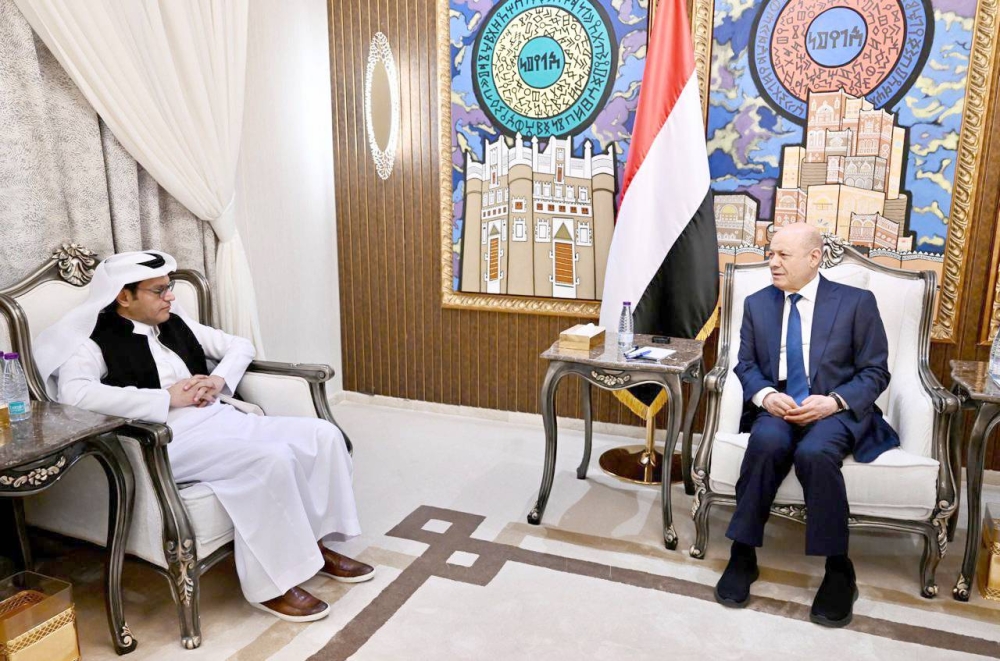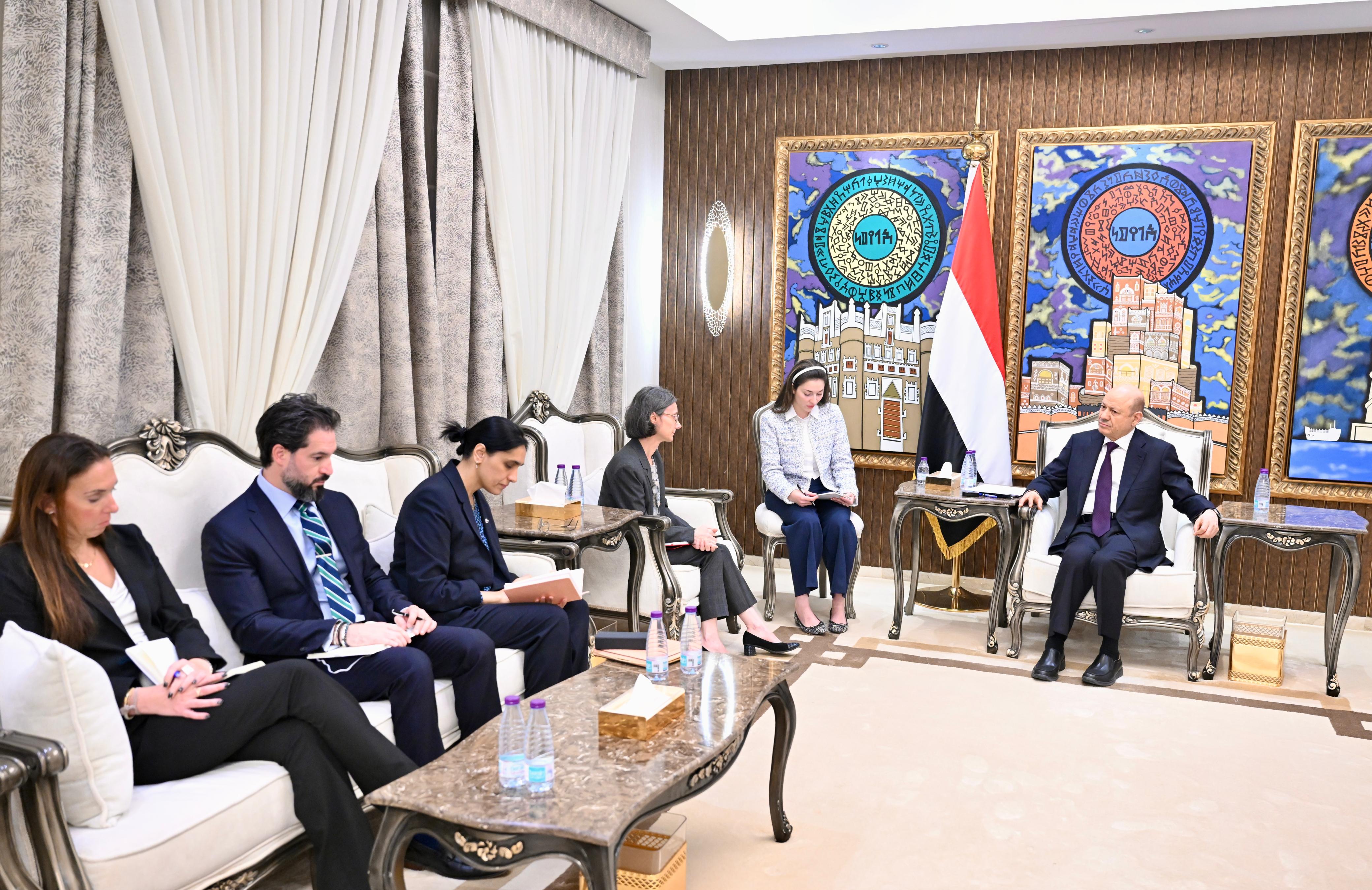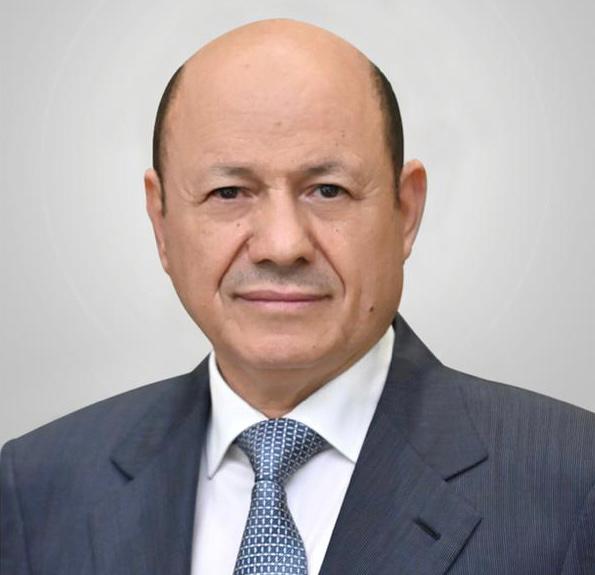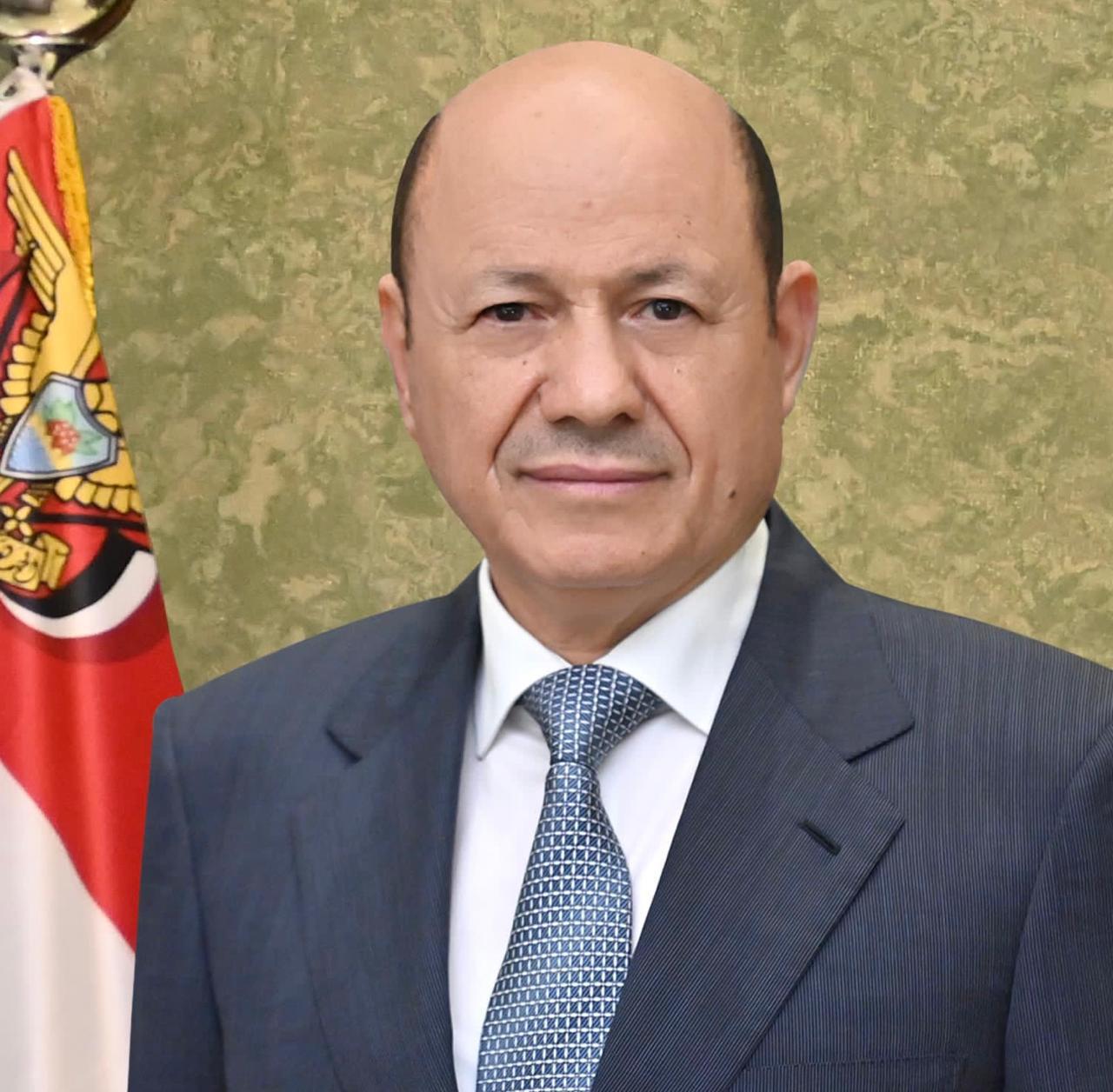
President Al-Alimi: Our Relationships with KSA Are Exceptional, and Terrorist Designation Is Best Peaceful Option against Rogue Militias
Aden
His Excellency President Dr. Rashad Mohammed Al-Alimi, President of the Presidential Leadership Council, affirmed that the international community's designation of the Houthi militias as a terrorist organization is the best peaceful option to deter the actions of this rogue group, which has rejected all diplomatic efforts to end the suffering of the Yemeni people.
In an interview with the Saudi newspaper "Okaz," the President of the Presidential Leadership Council praised the decision of President Donald Trump’s administration to re-designate the Houthi militias as a foreign terrorist organization, expressing his hope that the militias would fully grasp this firm message.
His Excellency urged the Houthis to prioritize the interests of the Yemeni people over those of their foreign backers and to accept a comprehensive peace solution based on national, regional, and international references.
The President noted that the U.S. decision aligns with the actions of the Yemeni government and the brothers in the Coalition to Support Legitimacy, who had previously designated the Houthis as a terrorist group. He stressed the importance of reaching this point, where the Presidential Leadership Council and the government will focus on mitigating the humanitarian impact on the Yemeni people, ensuring continued humanitarian aid, trade activities, and the flow of remittances from Yemeni expatriates around the world.
President Al-Alimi pointed out that when the U.S. administration revoked the terrorist designation, the Houthis misunderstood this step as a sign of weakness. Consequently, this led them to prolong the war and escalate their terrorist attacks on oil facilities, civilian assets, and international shipping routes, thereby deepening the humanitarian crises in Yemen and the region.
The President emphasized that the Presidential Leadership Council and the government welcomed all peace initiatives, including the truce agreed to in April 2022, which they have maintained to safeguard the interests of the Yemeni people, despite military violations by the militias and their gross human rights abuses, as well as violations of national and international laws.
However, in contrast to these initiatives, the Houthis conducted bombardments on oil export ports in Hadramout and Shabwa governorates , attacked international shipping lanes, and deprived the Yemeni people of essential revenues needed to pay salaries and provide basic services. These actions have exacerbated the humanitarian suffering and led to a depreciation of the national currency to levels never seen before.
The President further explained that, in response to the United Nations and the international community's request to reduce escalation, the government froze its decisions regarding the relocation of bank headquarters from Houthi-controlled Sana’a to the interim capital, Aden. This was intended to engage the Houthis in serious discussions to address the economic crises and revive peace efforts in accordance with the roadmap proposed by our brothers in Saudi Arabia. However, the Houthis responded by seizing three Yemenia Airways planes, attacking the Safer oil facility in Marib, kidnapping humanitarian workers, activists, and independent journalists, and issuing discriminatory laws to monopolize public sector employment for a specific group of their loyal militants.
The president of the Presidential Leadership Council stated that, in light of the prolonged defiance for over two decades of rebellion and armed coups against national consensus, it was necessary for the international community to adopt firm policies to deter these militias and drive them towards the option of peace according to its national, regional, and international references— particularly UN Security Council Resolution 2216.
“The war that the Houthis ignited has claimed over 500,000 Yemeni lives, pushed more than 20 million into hunger, and displaced hundreds of thousands across borders and continents, as well as more than four million internally displaced persons into camps under extremely harsh conditions, while crushing all means of a decent living.
He continued “therefore, without these international pressures and sanctions to cut off their sources of funding and weapons, the Houthis will not seriously engage in efforts to achieve comprehensive and just peace. Instead, they will continue their extortion tactics against the regional and international communities.”
President Al-Alimi acknowledged global concerns regarding the potential humanitarian impact of forceful measures against the Houthis. However, he stressed that if the world continues to fear that military action and terrorist designation might obstruct fragile de-escalation efforts, then it must find equally effective alternatives for deterrence.
“The best solution is for the international community to support the legitimate government in reclaiming full sovereignty over Yemen’s territory,” he asserted.
Reiterating that peace remains a strategic priority for the Presidential Leadership Council and the government, Al-Alimi noted that peace can only be achieved with a serious and responsible partner, meaning to be consciously aware of the difficulty of governing the country without the participation of all Yemenis. Furthermore, He warned against recognizing any armed faction that challenges state authority and disregards national laws and international treaties.
“The Houthis do not oppose peace out of concern for national sovereignty, as they claim. Rather, they seek to secure a position above the state for their leaders, who believe they have a divine right to rule. The Yemeni people will never accept this, no matter the sacrifices required,” he continued.
President Al-Alimi emphasized that the most viable and guaranteed path to achieving peace in Yemen is through supporting the legitimate government, enhancing its capacity to build the economy, provide services, and protect its territories and territorial waters.
He asserted that Yemen's recovery and stability are not merely national issues, but rather regional and global necessities, as its stability is critical for maintaining peace, regional security, and the surrounding maritime corridors.
The president denounced the Houthis’ widespread human rights violations in areas under their control, particularly their abductions of international staff members. He warned that despite attempts by Houthi political factions to deceive the international community, their extremist tactics remain unchanged.
“These militias will continue their arrests, abuses, and threats to maritime security because this is the way of life for such extremist group,” His Excellency added.
The President of the Presidential Leadership Council pointed out that the government has warned the international community about the risks of not relocating organizational headquarters to the interim capital, Aden. Moreover, he pledged to ensure the security of these organizations and facilitate the movement of their staff, as well as ensure access to their relief interventions for those in need across the country.
He emphasized that there is a widely held belief regarding the United Nations' responsibility for enabling the militias to abduct this unprecedented number of relief workers, non-governmental organization members, activists, and civil society leaders. This situation has arisen due to the UN's failure to respond to the Yemeni government's request to relocate its offices from Sana'a to the interim capital, Aden.
He explained that by not taking the threats from the militias seriously and maintaining their offices in Sana'a, this has inadvertently enabled the Houthis to use UN staff and resources as hostages for political leverage to extort the international community."
On the achievements of the Presidential Leadership Council and the allied national forces against the Houthi Imamate project, Al-Alimi said that the national alliance has grown stronger and more influential regionally and internationally.
He said: "When the Presidential Leadership Council was formed on April 7, 2022, under the Declaration of Transfer of Power and with the good efforts of our brothers in the Coalition to Support Legitimacy led by Saudi Arabia, the goal was to unify national components and enhance their role in both peace and war efforts." Additionally, His Excellency emphasized that dealing responsibly with all local, regional, and international developments was evident by the Presidential Leadership Council in embodying the spirit of consensus despite the expected differences regarding the priorities and various entitlements of the phase.
President Al-Alimi noted that the council recently approved a comprehensive strategy covering political, economic, and military aspects. He highlighted this step would not have been possible without the commitment of the council members and its components to a partnership approach and collective responsibility in facing intertwined challenges.
His Excellency the President stated that this partnership is reflected in the military domain, including the formation of a joint operations authority, which demonstrates the commitment of all components to partnership. He emphasized the principle of a unified front in addressing any potential escalation by the militias.
The President indicated that the Presidential Leadership Council has not only focused on integrating the operational framework of the armed forces, security, and all military formations—which included a project to merge intelligence agencies into a centralized State Security Service and establish a Counter-Terrorism Agency—but also on enhancing the efficiency of institutions, improving governance, and subjecting them to oversight mechanisms.
He also noted that the Presidential Leadership Council has been a close partner of the international community in de-escalating tensions and thwarting the Houthi militias' plans to return to comprehensive war and plunge the country into a broader humanitarian crisis.
The President of the Presidential Leadership Council acknowledged that there has been a kind of delay in implementing necessary changes within state institutions, particularly in the service sector. However, he emphasized that progress has continued steadily and thoughtfully at all levels.
He stated: “from the very first moment, we have focused on strengthening the presence of executive work from within and enhancing the efficiency of the interim capital, Aden, as it serves as the legal, political, and economic center of the stat.”
In this regard, His Excellency indicated that the Presidential Council has prioritized establishing justice and enhancing security, as the basis of governance and sources of strength by activating the judicial system and improving security institution's efficiency.”
He added, “at the same time, we have also tried to address some of the past grievances related to injustices in the southern governorates and to restore the rights of employees who were dismissed from their jobs following the summer war of 1994.
The president affirmed that the Council and the government, with the participation of various awareness platforms, have succeeded in reframing the prevailing political narrative surrounding the Yemeni issue, which previously lacked accuracy and depth. This has contributed to strengthening the isolation of the militias and reinforcing the international community's conviction regarding the persistent threat they pose to international peace and security.
In a comment on the demands protests taking place in some liberated governorates, the President affirmed that the Council and the government fully understand those protests and recognise their rightful causes, linked to the acute economic and financial challenges exacerbated by Houthi terrorist attacks on oil facilities.
“The Houthis believe that their economic warfare will cripple the government’s ability to provide services and pay salaries, creating an artificial equivalency between liberated areas and Houthi-controlled regions where salaries have been suspended for eight years. ” he affirmed.
His Excellency the President expressed confidence that this plan will fail as before.
The Presidential Leadership Council, in collaboration with the government, will work to address these demands, improve public resources, enhance living conditions, and support the national currency's position through a comprehensive economic rescue and recovery plan that was approved by the Council earlier this month.”
Regarding the situation in Hadramout, the President clarified that the Presidential Leadership Council has announced a plan to normalize conditions in the governorate, which includes recognizing the rightful demands of the people of Hadramout and addressing them through an executive framework in partnership with the government and local authorities. He stated: “We have great confidence in the wisdom of the people of this governorate, which has remained a model of state values and a driver of development, security, and peace in the country.The Presidential Leadership Council and the government will spare no effort to ensure justice for them and strengthen their established place in the national equation.
In this context, the President of the Presidential Leadership Council praised the fraternal support provided to the Yemeni people and their government by the Kingdom of Saudi Arabia across various fields.
He stated, “Without the generous support provided to the Yemeni government by the Kingdom, under the wise directives of the Custodian of the Two Holy Mosques, King Salman bin Abdulaziz, and His Royal Highness Prince Mohammed bin Salman, the Crown Prince and Prime Minister, the government would not have been able to meet its basic obligations, including paying employees’ salaries.
President Al-Alimi commended the Kingdom’s humanitarian and development initiatives through the King Salman Humanitarian Aid and Relief Center and the Saudi Program for the Development and Reconstruction of Yemen.
He also praised Project Masam for its critical role in clearing landmines planted by the Houthis across the country.
“Our relationship with Saudi Arabia is truly exceptional, with deep-rooted security, social, and economic dimensions that cannot be compared to any other bilateral relationship” he added.
He noted that over the past three years, this partnership has taken on a promising economic and developmental track, leading to the implementation of thousands of projects in the liberated governorates, funded by government resources, foreign support, and joint contributions.
He pointed out that the inauguration of the Prince Mohammed bin Salman Hospital in Aden, along with medical, educational, agricultural, fisheries, and water complexes, as well as renewable energy projects in several governorates, are at the top of these achievements.

President of Leadership Council Receives Ambassadors of France and United Kingdom and U.S. Chargé d’Affaires
His Excellency Dr. Rashad Mohammed Al-Alimi, President of the Presidential Leadership Council, received today, Sunday, Ms. Catherine Corm Kammoun, Ambassador of the French Republic, and Ms. Abda Sharif, Ambassador of the United Kingdom

President of the Leadership Council Leaves Aden for Consultations on National Developments
Fri ، 05 Dec 2025 03:54

